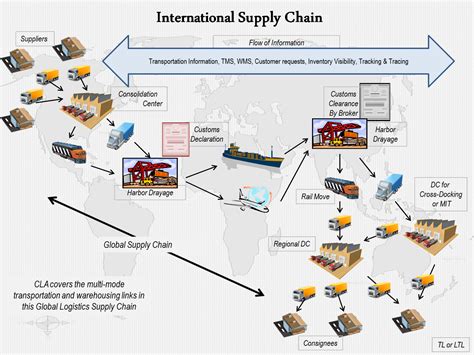Navigating the intricacies of global supply chains requires a strong foundation in the specialized vocabulary used by industry professionals. This quizlet will provide you with a comprehensive overview of key terms and definitions, empowering you to communicate effectively and maximize your success in this dynamic field.

Understanding Global Supply Chain Vocabulary
1. Supply Chain: A network of individuals, organizations, resources, and processes involved in the production, distribution, and consumption of goods and services.
2. Logistics: The planning, execution, and control of efficient and effective goods movement from point of origin to point of consumption.
3. Transportation: The movement of goods from one location to another, including modes such as air, sea, rail, and road.
4. Warehousing: The storage and management of goods at various points in the supply chain, ensuring their protection and accessibility.
5. Inventory: The total quantity of goods held at different stages of the supply chain, ranging from raw materials to finished products.
Essential Terms for Global Supply Chain Management
6. Globalization: The increasing economic, social, and political interconnectedness of countries and regions around the world.
7. Sourcing: The identification and procurement of goods or services from suppliers who meet specific quality, cost, and delivery requirements.
8. Distribution: The physical movement and delivery of goods to customers or designated locations.
9. Customs Clearance: The process of submitting required documentation and paying duties or taxes to release goods at import and export borders.
10. Supply Chain Visibility: The ability to track the movement, location, and status of goods throughout the supply chain, enhancing transparency and decision-making.
Advanced Terms for Supply Chain Professionals
11. Supply Chain Finance: Financial solutions designed to improve cash flow and optimize working capital for supply chain participants.
12. Reverse Logistics: The process of managing the return, refurbishment, or disposal of goods that are defective, unwanted, or obsolete.
13. Sustainability: The consideration of environmental, social, and economic factors in supply chain operations to minimize negative impacts and promote responsible practices.
14. Blockchain: A decentralized and secure digital ledger technology used to track and record transactions, such as goods movements and payments, in the supply chain.
15. Digitalization: The adoption of technology to enhance efficiency, transparency, and collaboration throughout the supply chain.
Quizlet Practice
Match the following terms with their definitions:
- Transportation
- Inventory
- Sourcing
- Customs Clearance
- Supply Chain Finance
Definitions:
- A. The process of procuring goods and services from suppliers
- B. The total stock of goods held at different stages of the supply chain
- C. The process of moving goods from one location to another
- D. The payment of duties or taxes to release goods at borders
- E. Financial solutions to improve cash flow for supply chain participants
Answers:
- C
- B
- A
- D
- E
Common Mistakes to Avoid
- Ignoring cultural differences: Understand and respect the cultural norms of different countries where you operate.
- Underestimating the importance of documentation: Maintain accurate and timely documentation for all shipments to avoid delays and fines.
- Overlooking sustainability: Consider the environmental and social impacts of your supply chain operations and take steps to minimize negative consequences.
- Failing to communicate effectively: Establish clear communication channels with suppliers, customers, and partners to ensure smooth coordination.
- Ignoring emerging technologies: Stay informed about technological advancements that can enhance supply chain efficiency and effectiveness.
Benefits of Mastering Global Supply Chain Vocabulary
- Improved communication: Effectively convey your ideas and strategies to colleagues and stakeholders.
- Enhanced problem-solving: Accurately identify and address supply chain challenges using the appropriate terminology.
- Increased credibility: Demonstrate your professionalism and expertise in the field.
- Greater collaboration: Foster better understanding and coordination with global supply chain partners.
- Optimized decision-making: Make informed decisions based on a comprehensive understanding of supply chain operations.
Conclusion
Mastering the vocabulary of global supply chain management is essential for effective communication, problem-solving, and collaboration in this complex and interconnected industry. By leveraging the terms and definitions provided in this quizlet, you can navigate the challenges and unlock the opportunities of global supply chains, driving business growth and success.
